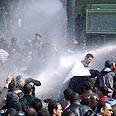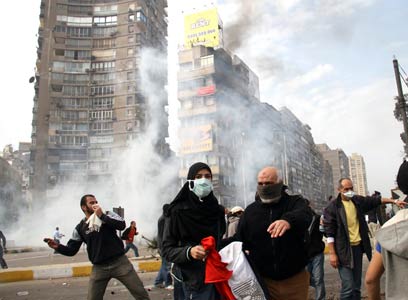
20 killed in Egypt protests; curfew defied
Military deploys in Cairo after mass demonstrations against President Mubarak claim lives of at least 16 people in Cairo and Suez; 1,030 wounded. Former IAEA chief ElBaradei placed under house arrest. Clinton: Egypt must respect citizen rights, reform
Egypt's military deployed on the streets of Cairo to enforce a nighttime curfew as the sun set Friday on a day of rioting and chaos that amounted to the biggest challenge ever to authoritarian President Hosni Mubarak's 30-year regime.
Still thousands in the capital Cairo defied the nationwide night curfew and tried to storm two major government buildings - the state TV and the Foreign Ministry. Others prayed on the streets after nightfall..
Friday's protests claimed the lives of at least 20 protestors, 15 in Suez and five in Cairo.
"They killed my brother," one of the protestors cried out. Protesters named him as Hamada Labib, 30, a driver. They blamed his death on a gunshot.
Flames rose up across a number of cities from burning tires and police cars. Even the ruling party headquarters in Cairo was ablaze in the outpouring of rage, bitterness and utter frustration with a regime seen as corrupt, heavy-handed and neglectful of grinding poverty that afflicts nearly half of the 80 million Egyptians.
According to medical sources, some 1,030 protesters were wounded in the riots. They earlier said some were seriously injured, including with gunshot wounds.
One of the opposition leaders, Ayman Nour of the liberal El-Ghad movement, was injured after a stone hit him in the head.
Egyptian President Hosni Mubarak, in his capacity as head of the military, announced a curfew in main cities starting from Friday after a day of unprecedented countrywide protests calling for him to step down.
"According to what some provinces witnessed in terms of riots, lawlessness, looting, destruction, attack and burning of public and private property including attacks on banks and hotels, President Hosni Mubarak decreed a curfew as a military ruler," a state TV announcer said.
It said the curfew would take effect from Friday evening, extending from 6 pm to 7 am and the main cities were Cairo, Alexandria and Suez. The curfew was later extended to all cities in Egypt, state TV reported.
After news of the curfew was passed from protester to protester, just minutes before it came into force, some stopped throwing stones at state security officers and asked them to join them in protests through the night.
Protesters and police embraced, many nodded in agreement or said they would join demonstrators. One police officer raised his fingers in a "V for a victory" sign. Others shouted words of encouragement and apologies at each other.
"You must join us," one demonstrator shouted at a security officer. "We need you and we are in this together, my brother."
The officer nodded his head, saying: "Of course I will."
"I can't believe our own police, our own government would keep beating up on us like this," said Cairo protester Ahmad Salah, 26. "I've been here for hours and gassed and keep going forward, and they keep gassing us, and I will keep going forward. This is a cowardly government and it has to fall. We're going to make sure of it."
Egyptian police abandoned central areas of the industrial port city after demonstrations in which thousands of protesters overwhelmed security lines and torched a police station, a Reuters witness said.

Protestors clash with police in Cairo (Photo: AP)
The Associated Press quoted Egyptian officials as saying that former International Atomic Energy Agency chief and Nobel Peace laureate Mohamed ElBaradei was placed under house arrest.
Police stationed outside his suburban Cairo home told him he cannot leave the house after he joined tens of thousands of protesters in the capital Friday.
ElBaradei returned to the country Thursday night from a month abroad and declared he was ready to lead the protesters to a regime change.
He was detained by the police earlier Friday before taking part in a quiet protest march. According to Arab media reports, the participants said they were holding a "quiet march" and some even shook hands with the police.
US: Situation of 'deep concern'
The United States on Friday called the security crackdown in Egypt a "deep concern" and urged Egyptian authorities to enact reforms and allow peaceful protests.
The White House said Friday that the United States would review its aid policy toward Egypt based on events that take place there in coming days.
White House spokesman Robert Gibbs made the comment at his daily news briefing about what he called a fluid and dynamic situation in Egypt and government efforts to crack down on sweeping protests in major Egyptian cities.
"We will be reviewing our assistance posture based on events now and in the coming days." said Gibbs.
Washington gave Egypt $1.3 billion in military aid and $250 million in economic aid in the 2010 fiscal year.
The US also warned citizens to avoid non-essential travel to Egypt and urged Americans in the country to stay put.
US Secretary of State Hillary Rodham Clinton appealed for Egyptian authorities to respect the rights of their citizens. She urged calm on both sides and said the government must investigate and prosecute any allegations of brutality by security forces against protesters. She also called on Egypt to restore access to the Internet and social media sites that have been blocked.
"We want to continue to partner with the Egyptian government and the Egyptian people. What will eventually happen in Egypt is up to the Egyptians," Clinton told reporters. "As a partner of Egypt we are urging that there be a restraint on the part of the security forces, there not be a rush to impose very strict measures that would be violent and that there be a dialogue between the government and the people of Egypt."

'How can our own police beat us up?' (Photo: AP)
State Department spokesman P.J. Crowley said Egypt, one of America's closest Arab allies, must respect the "fundamental rights" of its people, allow them to communicate and avoid violence if they want their country to thrive.
"Events unfolding in Egypt are of deep concern," Crowley said. "Fundamental rights must be respected, violence avoided and open communications allowed."
"Reform is vital to Egypt's long-term well-being," he said. "The Egyptian government should view its people as a partner and not as a threat."
Crowley's comments were posted on the micro-blog Twitter, which along with other social media sites and the Internet itself has been blocked by Egyptian authorities as the protests grow. Secretary of State Hillary Rodham Clinton was expected to address the rapidly unfolding developments later Friday.
The White House said President Barack Obama had several meetings with aides Friday about the security situation in Egypt and related demonstrations and unrest in other Arab nations.
The head of Egypt's opposition Wafd party said the country needed a period of transitional rule, new parliamentary elections and amendments to the constitution so a president can stand for only two six-year terms.
Parliament is overwhelmingly dominated by the ruling party. In the last parliament, Wafd held the second biggest opposition bloc of seats behind the Muslim Brotherhood.
The Brotherhood, which runs candidates as independents to skirt a ban on its political activities, also boycotted the last vote. The government insisted the vote was free and fair. Rights groups and other observers cited widespread abuses.
4 French journalists released
Tens of thousands of Egyptians took to the streets after the Friday prayers, demanding that President Hosni Mubarak resign after 30 years in power. Security officials said protests were held in at least 11 of the country's 28 regions.
In Cairo thousands called for Mubarak's dismissal, hurled stones and dirt at the police and destroyed posters of the president.
The police, in response, used rubber bullets and water cannons to disperse the crowd, and some of ElBaradei's supporters were beaten up with truncheons.
Egyptian protesters in Cairo chanted slogans calling for the army to support them, complaining of police violence. "Where is the army? Come and see what the police are doing to us. We want the army. We want the army," the protesters in one area of central Cairo shouted, shortly before police fired teargas on them.
The Internet via Egyptian servers was blocked across the country shortly after midnight, closing a key tool for activists relying on social media networks.
Mobile phone and text messaging services also appeared to be disabled or working sporadically. Facebook has been the main vehicle for announcing Friday's protest and identifying locations for demonstrations.
The government accused the Muslim Brotherhood of planning to exploit the youth protests for its "hidden agendas". The Brotherhood says it is being used as a scapegoat. At least 20 of the movement's activists were arrested on Thursday night, although it has yet to take part in the protests.
Mustafa el-Fiqi, chairman of the National Security and Foreign Relations committees in the Egyptian parliament, harshly criticized the government and called on its members to resign.
In an interview with a state-run television channel, el-Fiqi said he expects Prime Minister Ahmed Nazif to resign over the mass anti-government protests in the country.
According to reports, the government is planning increasing food subsidies, but it is not clear whether such a measure would be enough to contain the civil unrest.
According to reports, Minister of Trade and Industry Rashid Mohamed Rashid, who returned to Cairo on Thursday, may head the next government.
Egyptians claim PM Nazif's economic reforms led to increased unemployment and price hikes.
France's Foreign Ministry said Friday that Egyptian police released four French journalists detained while covering violent unrest in Cairo.
Ministry spokesman Bernard Valero confirmed French media reports saying that the four – for daily Le Figaro, weeklies Paris Match and Journal du Dimanche, and photo agency Sipa Press – were freed.
The Associated Press, Reuters and AFP contributed to this report
- Follow Ynetnews on Facebook










